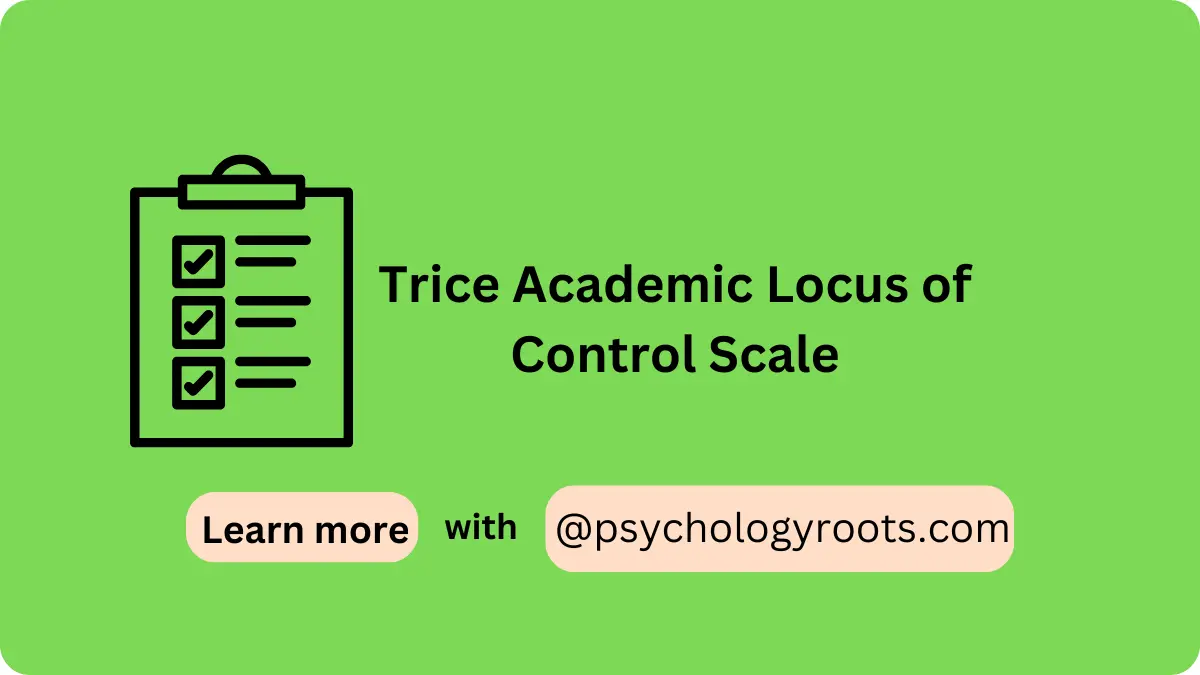Table of Contents
Trice Academic Locus of Control Scale
Here in this post, we are sharing the “Trice Academic Locus of Control Scale”. You can read psychometric and Author information. We have thousands of Scales and questionnaires in our collection (See Scales and Questionnaires). You can demand us any scale and questionnaires related to psychology through our community, and we will provide you with a short time. Keep visiting Psychology Roots.
About Trice Academic Locus of Control Scale
Scale Name
Trice Academic Locus of Control Scale
Author Details
Ashton D. Trice (1985)
Translation Availability
English

Background/Description
The Academic Locus of Control Scale (ALC), developed by Ashton D. Trice in 1985, is a self-report questionnaire designed to assess college students’ beliefs about whether they control their academic outcomes (internal locus) or if these outcomes are determined by external factors like luck or others (external locus). Rooted in Julian Rotter’s (1966) locus of control construct, the ALC is a context-specific measure focusing on academic settings, aligning with social learning theory. Cited in Trice (1985), it addresses the need for a specialized scale to predict academic behaviors more accurately than general locus of control measures.
The original ALC comprises 28 true/false items, such as “Some people have a knack for writing, while others will never write well no matter how they try.” Scores range from 0 to 28, with lower scores (0-14) indicating an internal locus (belief in personal control) and higher scores (>14) indicating an external locus (belief in external influences). A revised 21-item version, developed by Curtis and Trice (2013), improved psychometric properties by eliminating 7 items based on principal component analysis, yielding four factors. Scores correlate with academic outcomes like GPA, attendance, and measures of procrastination, depression, and anxiety. Validated in college student samples, the ALC is used to assess academic motivation, predict achievement, and inform interventions for study skills and self-efficacy.
Psychologists, educators, and higher education researchers use the ALC to evaluate students’ academic control beliefs, identify at-risk students, and design interventions to foster internal locus of control. Its specificity to academic contexts and predictive validity are strengths, though the Spanish adaptation’s lower reliability and English-primary availability may limit cross-cultural use.
Administration, Scoring and Interpretation
- Obtain a copy of the scale from authorized sources, such as Trice (1985) in Perceptual and Motor Skills (Vol. 61, pp. 1043-1046) or Curtis and Trice (2013), ensuring ethical use permissions.
- Explain the purpose to respondents, noting that it assesses beliefs about control over academic outcomes to support academic success, emphasizing anonymity and using clear, non-judgmental language.
- Provide instructions, asking respondents to answer true/false to each statement based on their general beliefs about academic performance. Use the 28-item version or the revised 21-item version, depending on study needs.
- Approximate time for completion is 5-7 minutes for the 28-item version or 3-5 minutes for the 21-item version.
- Administer in educational, clinical, or research settings, using paper or digital formats, ensuring a private environment. Oral administration may be used for accessibility.
Reliability and Validity
The ALC has robust psychometric properties, as reported in Trice (1985) and Curtis and Trice (2013). Internal consistency for the original 28-item scale is acceptable (Cronbach’s α ≈ 0.70-0.80), with the revised 21-item version showing improved reliability (α ≈ 0.75-0.85). Test-retest reliability is high (r ≈ 0.80-0.88 over 2-4 weeks), indicating stability.
Convergent validity is supported by correlations with academic behaviors, such as GPA (r ≈ -0.45, lower scores linked to higher GPA), attendance (r ≈ -0.30), and procrastination (r ≈ 0.40). Discriminant validity is evidenced by weaker correlations with unrelated constructs, like general intelligence (r < 0.20). Criterion validity is demonstrated by predicting academic achievement and dropout risk. The Spanish adaptation (Mayora & Fernández de Morgado, 2020) showed barely acceptable reliability (α ≈ 0.65) and a different four-factor structure, suggesting caution in cross-cultural use. The revised 21-item version’s four-factor structure (Curtis & Trice, 2013) enhances construct validity. Pairing with measures like the Self-Efficacy Scale (Scherer et al., 1982) can provide a broader assessment of academic motivation.
Available Versions
28-Items
Reference
Trice, A. D. (1985). An academic locus of control scale for college students. Perceptual and motor skills, 61(3_suppl), 1043-1046.
Important Link
Scale File:
Frequently Asked Questions
What does the Academic Locus of Control Scale measure?
It measures beliefs about control over academic outcomes in college students.
Who can use the scale?
Psychologists, educators, and higher education researchers studying college students.
How long does the scale take to complete?
It takes 5-7 minutes (28 items) or 3-5 minutes (21 items).
Is the scale specific to certain groups?
It targets college students, with a Spanish adaptation available.
Can the scale inform interventions?
Yes, its predictive validity supports interventions for academic motivation and success.
Disclaimer
Please note that Psychology Roots does not have the right to grant permission for the use of any psychological scales or assessments listed on its website. To use any scale or assessment, you must obtain permission directly from the author or translator of the tool. Psychology Roots provides information about various tools and their administration procedures, but it is your responsibility to obtain proper permissions before using any scale or assessment. If you need further information about an author’s contact details, please submit a query to the Psychology Roots team.
Help Us Improve This Article
Have you discovered an inaccuracy? We put out great effort to give accurate and scientifically trustworthy information to our readers. Please notify us if you discover any typographical or grammatical errors.
Make a comment. We acknowledge and appreciate your efforts.
Share With Us
If you have any scale or any material related to psychology kindly share it with us at psychologyroots@gmail.com. We help others on behalf of you.